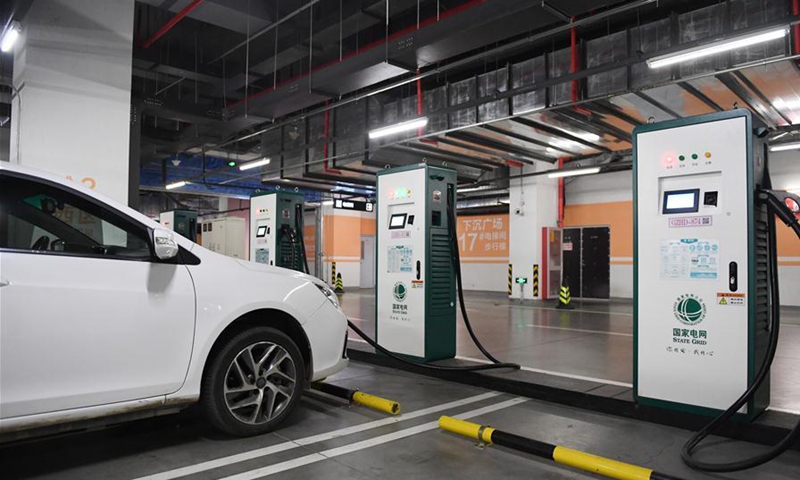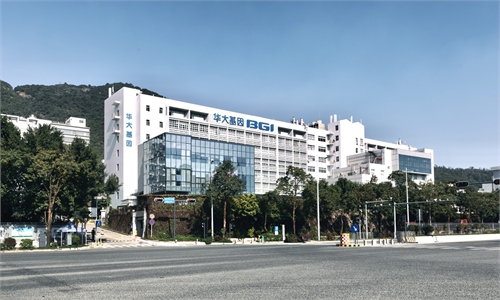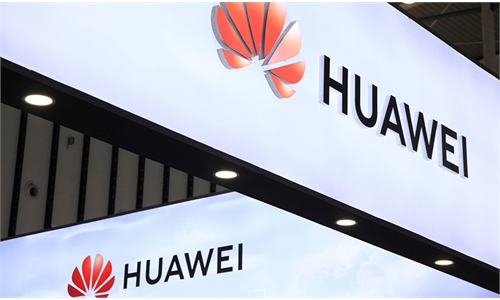Biden's EV goal boosts Chinese suppliers, but suspicion remains over eventual partnerships amid tensions

An electric vehicle is connected to one of the charging points at a newly-opened electric vehicle charging station in the underground parking lot of the Wukesong sports center in Beijing, capital of China, May 16, 2020. Photo: Xinhua
The Biden administration on Thursday set an ambitious goal to make clean cars account for half of new vehicles sold in the US by 2030, instantly turning out to be a boost to the electric vehicle sector across the Pacific.
Chinese lithium mining firms and battery suppliers, a vital part of global EV supply chains, are expected to benefit from Biden's goal, according to market observers, noting, however, that the local EV fleet has yet to be sufficiently international to take on their overseas counterparts.
There are also woes over the market being overwhelmed by what might be a pushy goal, especially factoring in the continuation of China-US tensions that could weigh on bilateral EV partnerships, as notably connected car technology - considered a key trend for EVs - risks pitting them against each other rather than uniting, according to those taking a doubtful stance.
In an executive order on strengthening US clean car leadership on Thursday (local time), Biden announced the goal that "50 percent of all new passenger cars and light trucks sold in 2030 be zero-emission vehicles, including battery electric, plug-in hybrid electric, or fuel cell electric vehicles."
China's battery industry is most likely to benefit from the US EV boom, as the battery accounts for 30-40 percent of the cost of EV, Zhang Xiang, a research fellow at the Research Center of Automobile Industry Innovation under the North China University of Technology, told the Global Times on Friday.
"The capital and technology threshold of the EV battery is relatively high, but Chinese companies have rich experience after 10 years of rapid development and have the strength to build factories in the US to increase sales.
Battery suppliers such as CATL and EVE Energy have started their presence in Europe. CATL and BYD have also started supplying batteries to Tesla.
"This proves that Chinese battery suppliers meet the standards of international carmakers," said Zhang.
BYD's shares in both Chinese mainland and Hong Kong trading closed up on Friday, outperforming the benchmarks. Lithium-relate firms in the A-share market also gained, while mainland shares fell across the board.
Based on its EV market size, China accounts for nearly 50 percent of the global EV battery market. CATL takes 43 percent of the Chinese battery market, with BYD taking 20 percent, according to Zhang.
Still, China's EV makers are currently not yet well-equipped to compete with the US and European manufacturers, analysts said.
"Generally, car companies need to have certain economies of scale before they can export overseas, which is equivalent to selling 500,000 to 1 million cars a year. At present, China's EV brands do not have the conditions. Shipping long distances, setting up local service networks and other relevant equipment are costly," said Zhang.
Sales of BYD NEVs reached 189,689 last year. In terms of newly emerging EV makers, Nio delivered 43,728 vehicles in 2020, according to the company. Xpeng sold 27,041 vehicles, compared with 33,457 vehicles of Li Auto.
Also worth noting is that in addition to skepticism that the goal could be too lofty as it would entail enormous government incentives such as consumer subsidies, there are also concerns that even the initial excitement on the part of Chinese suppliers might prove abortive.
"With no end to the US containment policy in sight, there's actually a big question over whether bilateral EV partnerships would mean anything big, especially considering that EVs are heading toward connected cars, an arena of connectedness that's set to become more important than the current smartphone-enabled world of connectivity," Zeng Zhiling, managing director of LMC Automotive Consulting in Shanghai, told the Global Times on Friday.
Instead of forging closer ties, there's a chance of the two countries heading for even wider divisiveness in the EV era, he noted.


